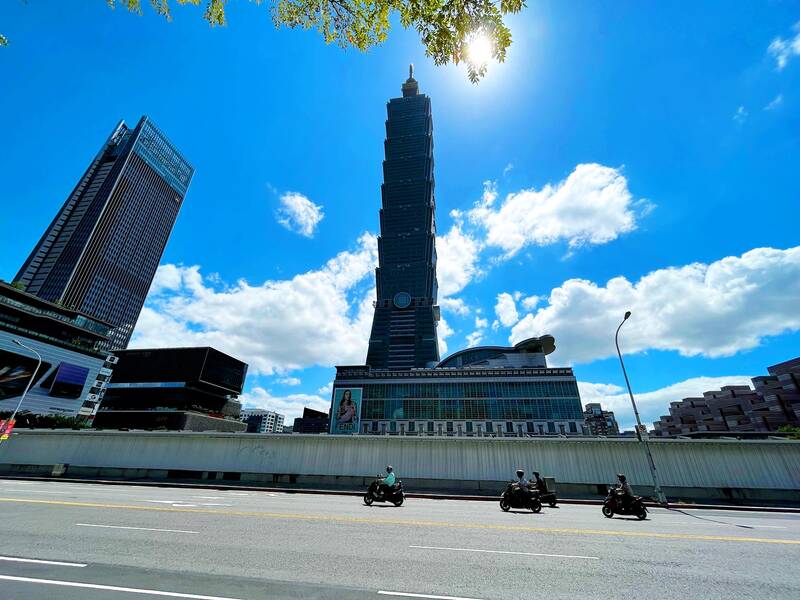The iconic Taipei 101 skyscraper has been named the property with the highest land value in the capital city for the 11th consecutive year, followed by Cathay Landmark (國泰置地廣場) and Shin Kong Life Tower (新光摩天大樓), the Taipei Department of Land Administration said on Wednesday.
Each ping (33.1m2) on the Taipei 101 plot is worth about NT$6.615 million (US$63,939), the most expensive in the city, as it is a long-standing famous landmark and home to many office buildings, the land administration said.
The Cathay Landmark, located on Zhongxiao E Road, is valued at NT$6.34 million per ping, making it the second-highest in Taipei for the first time, while Shin Kong Life Tower on Zhongxiao W Road is third at NT$6.29 million per ping.

Photo: Hsu Yi-ping, Taipei Times
The land administration said the Shin Kong Life Tower had been “the king of land” between 1990 and 2013, but that Taipei 101 has held the title since 2014.
Regarding residential buildings, the Palace Mansion (宏勝帝寶) in Daan District (大安) was assessed as having the highest land value, with each ping valued at NT$4.74 million. Ren Ai Shang Hua (仁愛尚華) and Ren Ai Lee Ching (仁愛麗景) in Xinyi District (信義), meanwhile, were placed joint-second, with each ping valued at NT$4.46 million.
The land administration said the citywide assessment was based on a survey of property transactions from Sept. 2 last year to Sept. 1. Land value in the city is estimated to have increased 0.29 percent on average over the period, it said.
The land value rose in all of the city’s 12 administrative districts except for Shilin District (士林), where it dropped, it added.

CHIP RACE: Three years of overbroad export controls drove foreign competitors to pursue their own AI chips, and ‘cost US taxpayers billions of dollars,’ Nvidia said China has figured out the US strategy for allowing it to buy Nvidia Corp’s H200s and is rejecting the artificial intelligence (AI) chip in favor of domestically developed semiconductors, White House AI adviser David Sacks said, citing news reports. US President Donald Trump on Monday said that he would allow shipments of Nvidia’s H200 chips to China, part of an administration effort backed by Sacks to challenge Chinese tech champions such as Huawei Technologies Co (華為) by bringing US competition to their home market. On Friday, Sacks signaled that he was uncertain about whether that approach would work. “They’re rejecting our chips,” Sacks

NATIONAL SECURITY: Intel’s testing of ACM tools despite US government control ‘highlights egregious gaps in US technology protection policies,’ a former official said Chipmaker Intel Corp has tested chipmaking tools this year from a toolmaker with deep roots in China and two overseas units that were targeted by US sanctions, according to two sources with direct knowledge of the matter. Intel, which fended off calls for its CEO’s resignation from US President Donald Trump in August over his alleged ties to China, got the tools from ACM Research Inc, a Fremont, California-based producer of chipmaking equipment. Two of ACM’s units, based in Shanghai and South Korea, were among a number of firms barred last year from receiving US technology over claims they have

BARRIERS: Gudeng’s chairman said it was unlikely that the US could replicate Taiwan’s science parks in Arizona, given its strict immigration policies and cultural differences Gudeng Precision Industrial Co (家登), which supplies wafer pods to the world’s major semiconductor firms, yesterday said it is in no rush to set up production in the US due to high costs. The company supplies its customers through a warehouse in Arizona jointly operated by TSS Holdings Ltd (德鑫控股), a joint holding of Gudeng and 17 Taiwanese firms in the semiconductor supply chain, including specialty plastic compounds producer Nytex Composites Co (耐特) and automated material handling system supplier Symtek Automation Asia Co (迅得). While the company has long been exploring the feasibility of setting up production in the US to address

OPTION: Uber said it could provide higher pay for batch trips, if incentives for batching is not removed entirely, as the latter would force it to pass on the costs to consumers Uber Technologies Inc yesterday warned that proposed restrictions on batching orders and minimum wages could prompt a NT$20 delivery fee increase in Taiwan, as lower efficiency would drive up costs. Uber CEO Dara Khosrowshahi made the remarks yesterday during his visit to Taiwan. He is on a multileg trip to the region, which includes stops in South Korea and Japan. His visit coincided the release last month of the Ministry of Labor’s draft bill on the delivery sector, which aims to safeguard delivery workers’ rights and improve their welfare. The ministry set the minimum pay for local food delivery drivers at